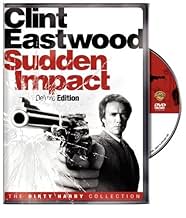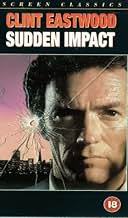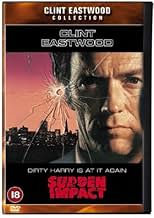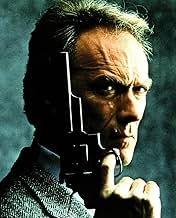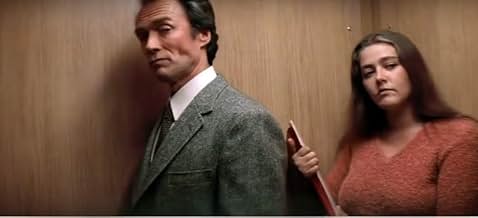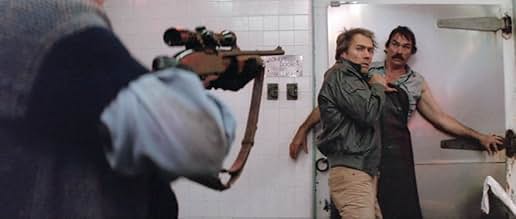VALUTAZIONE IMDb
6,6/10
50.848
LA TUA VALUTAZIONE
Una vittima di stupro intraprende una vendetta contro i suoi aggressori in una piccola città costiera vicino a San Francisco. Harry Callahan, sospeso per aver sfidato i suoi superiori, viene... Leggi tuttoUna vittima di stupro intraprende una vendetta contro i suoi aggressori in una piccola città costiera vicino a San Francisco. Harry Callahan, sospeso per aver sfidato i suoi superiori, viene assegnato al caso.Una vittima di stupro intraprende una vendetta contro i suoi aggressori in una piccola città costiera vicino a San Francisco. Harry Callahan, sospeso per aver sfidato i suoi superiori, viene assegnato al caso.
- Regia
- Sceneggiatura
- Star
- Premi
- 3 candidature totali
Audrie Neenan
- Ray Parkins
- (as Audrie J. Neenan)
Recensioni in evidenza
A rape victim is going around, bumping off her attackers one by one, having been denied justice originally. A rather unconventional detective, Callahan is put on the case.. but whose side will he take?
This is one of the most brutal films I've seen in quite some time. Virtually every scene seems to be a set-up for some punks to make the mistake of annoying our hero, who then proceeds to beat the living daylights out of them, or simply blows their heads off. I am 100% convinced that if any serving officer did what the Eastwood character gets away with in this film, he would not only be stripped of his badge, but also be looking at a considerable stretch in prison. Another striking aspect of the picture is the violence used against the fairer sex. The female cast members get punched in the face, kicked when on they're on the ground.. And that doesn't even include the constant flashbacks we get of Sondra Locke's sexual assault ordeal (We get one every time she carries out one of her revenge attacks on her aggressors). The misogyny displayed on screen is incredible and is unlikely to endear itself to anyone concerned about domestic violence.
So why am I recommending it? Well for a start, the film is well directed, with some very exciting gunfights and car chases which will keep you on the edge of your seat. But the main reason for watching is Clint himself, the evergreen icon giving us another classy performance as a veteran cop who might not share the ethics of the modern police force, but tends to do the job 10x better than his colleagues who do it all 'by the book'. If only we had someone like that here in Britain, perhaps this country wouldn't be the crime hotspot it is these days.. 6/10
This is one of the most brutal films I've seen in quite some time. Virtually every scene seems to be a set-up for some punks to make the mistake of annoying our hero, who then proceeds to beat the living daylights out of them, or simply blows their heads off. I am 100% convinced that if any serving officer did what the Eastwood character gets away with in this film, he would not only be stripped of his badge, but also be looking at a considerable stretch in prison. Another striking aspect of the picture is the violence used against the fairer sex. The female cast members get punched in the face, kicked when on they're on the ground.. And that doesn't even include the constant flashbacks we get of Sondra Locke's sexual assault ordeal (We get one every time she carries out one of her revenge attacks on her aggressors). The misogyny displayed on screen is incredible and is unlikely to endear itself to anyone concerned about domestic violence.
So why am I recommending it? Well for a start, the film is well directed, with some very exciting gunfights and car chases which will keep you on the edge of your seat. But the main reason for watching is Clint himself, the evergreen icon giving us another classy performance as a veteran cop who might not share the ethics of the modern police force, but tends to do the job 10x better than his colleagues who do it all 'by the book'. If only we had someone like that here in Britain, perhaps this country wouldn't be the crime hotspot it is these days.. 6/10
For a while, "Sudden Impact" plays like a a highlight reel of Dirty Harry's signature moves. The altercations occur one after another, his superiors are pretty much meaningless, and Eastwood scowls all throughout. Forget rationalizing his actions; it's just entertaining.
Up until that second half at least, which is when things turn towards dramatic as a serial killer/revenge flick. There's still the body count, but it's not as fun as seeing Eastwood laying down larger-than-life street justice. Take that early coffee shop robbery for example; a well-staged shootout that almost brings The Man With No Name to mind. It's terrific.
6/10
Up until that second half at least, which is when things turn towards dramatic as a serial killer/revenge flick. There's still the body count, but it's not as fun as seeing Eastwood laying down larger-than-life street justice. Take that early coffee shop robbery for example; a well-staged shootout that almost brings The Man With No Name to mind. It's terrific.
6/10
The vigilante has long held a fascination for audiences, inasmuch as it evokes a sense of swift, sure justice; good triumphs over evil and the bad guy gets his deserts. It is, in fact, one of the things that has made the character of Dirty Harry Callahan (as played by Clint Eastwood) so popular. He carries a badge and works within the law, but at heart, Harry is a vigilante, meting out justice `his' way, which often puts him in conflict with his own superiors, as well as the criminals he's pursuing. But it's what draws the audience; anyone who's ever been bogged down in bureaucratic nonsense of one kind or another, delights in seeing someone cut through the red tape and get on with it-- even if it's only on the screen. And that satisfaction derived from seeing justice done-- and quickly-- is one of the elements that makes `Sudden Impact,' directed by and starring Eastwood, so successful. In this one, the fourth of the series, while working a homicide, Harry encounters a bona fide vigilante at work-- an individual whose brand of justice parallels his own, with one exception: Whoever it is, he's definitely not carrying a badge.
In his own inimitable way, Inspector Callahan has once again ended up on the bad side of the department and is ordered to take some vacation time. So he does; as only `Dirty Harry' can. In a small town north of San Francisco, Harry finds himself smack dab in the middle of a homicide case, which he quickly links to a recent murder in San Francisco because of the unique M.O. employed by the perpetrator. Unaccountably, Harry encounters resistance from the local Police Chief, Jannings (Pat Hingle), who advises him to take his big city tactics and methods elsewhere. Not one to be deterred, however, Harry continues his investigation, which ultimately involves a beautiful and talented young artist, Jennifer Spencer (Sondra Locke). Gradually, Harry discovers a link between the victims; the burning question, though, is where does Jennifer Spencer fit into the picture?
Eastwood is in top form here, both in front of and behind the camera, and it is arguably the second best of the five-film series, right behind the original `Dirty Harry.' It had been seven years since the last `Harry' offering (`The Enforcer,' 1976), but Eastwood steps right back into the character with facility and renewed vigor. And this one definitely benefits from having him in the director's chair, as he is able to recapture the essence of, not only his own character, but that `spirit' that made these films so successful, and he does it by knowing the territory and establishing a continuity that all but erases that seven year gap between #s 3 and 4. As with all the films he directs, Eastwood sets a deliberate pace that works perfectly for this material and creates just enough tension to keep it interesting and involving from beginning to end.
The screenplay, by Joseph Stinson, is well written and formulated to that distinctive `Dirty Harry' style; the dialogue is snappy and the story itself (conceived by Charles B. Pierce and Earl E. Smith) is the most engaging since the original `Dirty Harry,' as it successfully endeavors to play upon the very personal aspects of the drama, rather than entirely upon the action. The characters are well drawn and convincing, and, of course, this is the film that gave us one of Harry's best catch-phrases: `Go, ahead-- make my day...'
As Harry, Clint Eastwood perfectly embodies all of the elements that make this character so popular: He lives by a personal moral code, a true individual made of the kind of stuff we envision as that of the pioneers who settled this country and made America what it is today. Harry personifies that sense of freedom and justice we all strive for and hold so dear, possibly more so today than ever before. No matter who we are or where we come from, there's undeniably a part of us that wants to be Harry, or at least have him around. `Dirty Harry' is an icon of the cinema, and it's impossible to envision anyone but Eastwood portraying him; for better or worse, Eastwood `is' Dirty Harry, without question, just as Sean Connery is James Bond and Basil Rathbone, Sherlock Holmes.
Sondra Locke is entirely effective here in the role of Jennifer Spencer, a young woman wronged and out for vengeance, or as she sees it, `justice.' She manages to bring a hard-edged determination laced with vulnerability to her character, with a convincing, introspective approach that is far beyond what is typical of the `action' genre. Even amid the violence, Locke keeps her focus on Jennifer and the traumatic events that have brought her to this stage of her life. Her portrayal makes a perfect complement to Eastwood's Harry, and becomes, in philosophy and deed, something of his counterpart.
In supporting roles, two performances stand out: Paul Drake, as Mick, creates the best `psycho' since Andy Robinson's dynamic portrayal of the serial killer in the original `Dirty Harry.' With actually very limited screen time, Drake establishes a genuinely disconcerting presence that is believable and convincing, which adds much to the purely visceral response of the audience. This is the guy you can't wait to see Harry take care of in the end. Also effective is Audrie J. Neenan, who makes her character, Ray Parkins, the epitome of the proverbial `low life,' who can be found in any bar in any city. It's a performance that evokes a gut-level response, and it adds greatly to the credibility of the film, in that it helps provide that necessary sense of realism.
The supporting cast includes Albert Popwell (Horace), Mark Kevloun (Bennett) and Nancy Parsons (Mrs. Kruger). With a perfect blend of drama and action, `Sudden Impact' dispenses justice that is a fulfilling respite from reality; the perfect justice of a not-so-perfect world, that makes for a satisfying cinematic experience. 9/10.
In his own inimitable way, Inspector Callahan has once again ended up on the bad side of the department and is ordered to take some vacation time. So he does; as only `Dirty Harry' can. In a small town north of San Francisco, Harry finds himself smack dab in the middle of a homicide case, which he quickly links to a recent murder in San Francisco because of the unique M.O. employed by the perpetrator. Unaccountably, Harry encounters resistance from the local Police Chief, Jannings (Pat Hingle), who advises him to take his big city tactics and methods elsewhere. Not one to be deterred, however, Harry continues his investigation, which ultimately involves a beautiful and talented young artist, Jennifer Spencer (Sondra Locke). Gradually, Harry discovers a link between the victims; the burning question, though, is where does Jennifer Spencer fit into the picture?
Eastwood is in top form here, both in front of and behind the camera, and it is arguably the second best of the five-film series, right behind the original `Dirty Harry.' It had been seven years since the last `Harry' offering (`The Enforcer,' 1976), but Eastwood steps right back into the character with facility and renewed vigor. And this one definitely benefits from having him in the director's chair, as he is able to recapture the essence of, not only his own character, but that `spirit' that made these films so successful, and he does it by knowing the territory and establishing a continuity that all but erases that seven year gap between #s 3 and 4. As with all the films he directs, Eastwood sets a deliberate pace that works perfectly for this material and creates just enough tension to keep it interesting and involving from beginning to end.
The screenplay, by Joseph Stinson, is well written and formulated to that distinctive `Dirty Harry' style; the dialogue is snappy and the story itself (conceived by Charles B. Pierce and Earl E. Smith) is the most engaging since the original `Dirty Harry,' as it successfully endeavors to play upon the very personal aspects of the drama, rather than entirely upon the action. The characters are well drawn and convincing, and, of course, this is the film that gave us one of Harry's best catch-phrases: `Go, ahead-- make my day...'
As Harry, Clint Eastwood perfectly embodies all of the elements that make this character so popular: He lives by a personal moral code, a true individual made of the kind of stuff we envision as that of the pioneers who settled this country and made America what it is today. Harry personifies that sense of freedom and justice we all strive for and hold so dear, possibly more so today than ever before. No matter who we are or where we come from, there's undeniably a part of us that wants to be Harry, or at least have him around. `Dirty Harry' is an icon of the cinema, and it's impossible to envision anyone but Eastwood portraying him; for better or worse, Eastwood `is' Dirty Harry, without question, just as Sean Connery is James Bond and Basil Rathbone, Sherlock Holmes.
Sondra Locke is entirely effective here in the role of Jennifer Spencer, a young woman wronged and out for vengeance, or as she sees it, `justice.' She manages to bring a hard-edged determination laced with vulnerability to her character, with a convincing, introspective approach that is far beyond what is typical of the `action' genre. Even amid the violence, Locke keeps her focus on Jennifer and the traumatic events that have brought her to this stage of her life. Her portrayal makes a perfect complement to Eastwood's Harry, and becomes, in philosophy and deed, something of his counterpart.
In supporting roles, two performances stand out: Paul Drake, as Mick, creates the best `psycho' since Andy Robinson's dynamic portrayal of the serial killer in the original `Dirty Harry.' With actually very limited screen time, Drake establishes a genuinely disconcerting presence that is believable and convincing, which adds much to the purely visceral response of the audience. This is the guy you can't wait to see Harry take care of in the end. Also effective is Audrie J. Neenan, who makes her character, Ray Parkins, the epitome of the proverbial `low life,' who can be found in any bar in any city. It's a performance that evokes a gut-level response, and it adds greatly to the credibility of the film, in that it helps provide that necessary sense of realism.
The supporting cast includes Albert Popwell (Horace), Mark Kevloun (Bennett) and Nancy Parsons (Mrs. Kruger). With a perfect blend of drama and action, `Sudden Impact' dispenses justice that is a fulfilling respite from reality; the perfect justice of a not-so-perfect world, that makes for a satisfying cinematic experience. 9/10.
It's at this point that the 'Dirty Harry' series really starts to blend into itself, with set-pieces from one entry easily being mistaken for those in another. The overall stories still distinguish themselves, though. 'Sudden Impact (1983)' is perhaps the least conventional in the franchise, at least in terms of how it relates to the first in its series, as it follows both Eastwood's disgruntled detective and the serial killer he's chasing in, essentially, equal measure. It's at its most interesting when it explores themes of justice, revenge and how the system can sometimes fail. Unfortunately, it sort of goes back on Harry's character in the process, ending on a decision that would have made his skin crawl in any other feature. It's not a huge issue, but it is noticeable. So is the generally less entertaining nature of the flick, which doesn't feel quite as confident as any of the others in its franchise. It's entertaining enough, don't get me wrong. In fact, it's usually enjoyable. It's just that it has stretches that are almost dull and, as a whole, isn't as compelling as it could have been. It's a good film, just not a great one. 6/10
It's a strange thing to see a film where some scenes work rather weakly (if only in comparison to other films in its legacy), and others in a 'sub-plot' or supporting story are surprisingly provocative and strong. Sudden Impact is one of those cases, where Clint Eastwood as star/producer/director shows when he can be at his best, or at his lessor of times when dealing with a crime/mystery/detective story in his Dirty Harry fame. We get that 'make my day' line, and un-like in the first film where his 'do I feel lucky' speech was playful and cool the first time and the second time at the end tough as nails, here it's switched around. He gets into another shamble with the department, as usual, when he tries to fight crime 'his' way, in particular with a diner robbery (inspiration for Pulp Fiction?) and with a high speed pursuit with a senior citizen bus. He's told to 'take a vacation', and that's the last thing on his mind. This whole main plot isn't very convincing aside from the expectancy of the story and lines, which just adds to the frustration. But soon his story merges with the sub-plot that Eastwood develops from the start.
Enter Sandra Locke's character, Jennifer Spencer, whom we soon learn after some (appropriately) mysterious scenes that she and her shy sister were victims of a cruel, unjust sexual assault (err, outright rape), and is sleekly, undercover-like, getting revenge. Her scenes and story are the strongest parts of the film, the most intense, and finally when it goes into Callahan's storyline (he's getting facts in the same small town she's in on a murder), the film finally finds a focus between Eastwood's classic form of clearly defined good vs. evil (though sometimes blurred, to be sure). Eastwood films the flashbacks, not to say too much about them, expertly, in a fresh, experimental style; the trademark Lalo Schifrin score is totally atmospheric in these scenes and in others. It almost seems like a couple of times an art-house sensibility has crept into Eastwood's firmly straightforward storytelling style, which helps make the film watchable.
It's a shame, though, that in the end it goes more for the expectable (or maybe not expectable) points, and until the third act Callahan doesn't have much to do except his usual 'it's smith...Wesson...and me' shtick. However, with Locke he gets out of her a very good performance (more subtle and touching than the one in the Gauntlet) and an exciting climax at an amusement park. In a way I do and don't agree with Ebert's remark that it's like a 'music video' in Eastwood's style here. I admit there is comparisons with the simplicity of both, the directness, but the scenes where Eastwood does break form are superior to those of any music video. It's cheesy, it's hard-edged, it's not up to par with the first two 'Harry' pictures, but hey, there could be worse ways to spend a couple hours with the master of the .44.
Enter Sandra Locke's character, Jennifer Spencer, whom we soon learn after some (appropriately) mysterious scenes that she and her shy sister were victims of a cruel, unjust sexual assault (err, outright rape), and is sleekly, undercover-like, getting revenge. Her scenes and story are the strongest parts of the film, the most intense, and finally when it goes into Callahan's storyline (he's getting facts in the same small town she's in on a murder), the film finally finds a focus between Eastwood's classic form of clearly defined good vs. evil (though sometimes blurred, to be sure). Eastwood films the flashbacks, not to say too much about them, expertly, in a fresh, experimental style; the trademark Lalo Schifrin score is totally atmospheric in these scenes and in others. It almost seems like a couple of times an art-house sensibility has crept into Eastwood's firmly straightforward storytelling style, which helps make the film watchable.
It's a shame, though, that in the end it goes more for the expectable (or maybe not expectable) points, and until the third act Callahan doesn't have much to do except his usual 'it's smith...Wesson...and me' shtick. However, with Locke he gets out of her a very good performance (more subtle and touching than the one in the Gauntlet) and an exciting climax at an amusement park. In a way I do and don't agree with Ebert's remark that it's like a 'music video' in Eastwood's style here. I admit there is comparisons with the simplicity of both, the directness, but the scenes where Eastwood does break form are superior to those of any music video. It's cheesy, it's hard-edged, it's not up to par with the first two 'Harry' pictures, but hey, there could be worse ways to spend a couple hours with the master of the .44.
Lo sapevi?
- QuizCharles B. Pierce wrote the line "Go ahead, make my day." The line was inspired by a warning that his father would say to Pierce when he was a child. According to Pierce, his father warned him "When I come home tonight and the yard has not been mowed, you're gonna make my day."
- BlooperAs Horace exits the car while visiting Harry, who is about to begin target shooting in the woods, one of the Panavision cameras is clearly visible, reflected in the car window, as well as Eastwood's son, who was visiting the set.
- Citazioni
[Callahan dares a crook to shoot his hostage]
Harry Callahan: Go ahead, make my day.
- Versioni alternativeJust like with the previous movies, the 5.1 DVD/Blu-ray remix replaces a bunch of sound effects (mostly gunshots) with more modern ones. However, in addition to that right before the carnival shootout at the end, originally when Harry was approaching the villains, the music had a very loud screeching sound, but the remix completely removes it. (but remains intact on the soundtrack and foreign mono tracks)
- ConnessioniFeatured in At the Movies: Christine/Silkwood/Sudden Impact/Thriller (1983)
- Colonne sonoreTHIS SIDE OF FOREVER
Performed by Roberta Flack
Music by Lalo Schifrin
Lyrics by DeWayne Blackwell (as Dewayne Blackwell)
I più visti
Accedi per valutare e creare un elenco di titoli salvati per ottenere consigli personalizzati
Dettagli
Botteghino
- Budget
- 22.000.000 USD (previsto)
- Lordo Stati Uniti e Canada
- 67.642.693 USD
- Fine settimana di apertura Stati Uniti e Canada
- 9.688.561 USD
- 11 dic 1983
- Lordo in tutto il mondo
- 67.642.693 USD
Contribuisci a questa pagina
Suggerisci una modifica o aggiungi i contenuti mancanti

Divario superiore
By what name was Coraggio... fatti ammazzare (1983) officially released in India in English?
Rispondi

